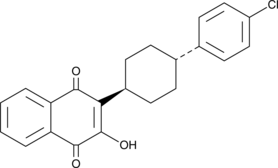Description
An antiprotozoal agent; inhibits complex III activity on dihydroorotate in isolated P. falciparum and P. yoelii mitochondria more potently than in rat liver mitochondria (EC50s = 0.95, 0.94, and 510 nM, respectively); depolarizes the mitochondrial membrane in P. yoelii-infected mouse erythrocytes (EC50 = 260 nM); inhibits human BCRP- and P-glycoprotein-mediated transport in membrane vesicles (IC50s = 0.23 and 6.8 μM, respectively); inhibits the growth of T. gondii in MRC-5 human lung fibroblasts in vitro (IC50 = ~64 nM); increases mean survival of T. gondii-infected mice from 5.5 to 21.2 days (100 mg/kg per day)
Formal name: 2-[trans-4-(4-chlorophenyl)cyclohexyl]-3-hydroxy-1,4-naphthalenedione
Synonyms: BW 556C-80|BW 566C
Molecular weight: 366.8
CAS: 95233-18-4
Purity: ≥98%
Formulation: A crystalline solid
Product Type|Biochemicals|Antiparasitics|Antiprotozoals||Product Type|Biochemicals|Small Molecule Inhibitors|Oxidative Phosphorylation||Research Area|Cell Biology|Mitochondrial Biology||Research Area|Immunology & Inflammation||Research Area|Infectious Disease|Fungal Diseases|Pneumonia||Research Area|Infectious Disease|Parasitic Diseases|Malaria||Research Area|Infectious Disease|Parasitic Diseases|Toxoplasmosis




